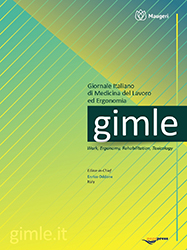Investigating burnout situations, nurses’ stress perception and effect of a post-graduate education program in health care organizations of northern Italy: a multicenter study
[Indagine sulle situazioni di burnout, percezione dello stress da parte degli infermieri ed effetti di un programma di formazione post-laurea nelle organizzazioni sanitarie del nord Italia: uno studio multicentrico]
All claims expressed in this article are solely those of the authors and do not necessarily represent those of their affiliated organizations, or those of the publisher, the editors and the reviewers. Any product that may be evaluated in this article or claim that may be made by its manufacturer is not guaranteed or endorsed by the publisher.
Authors
Background. Burnout (BO) is increasingly considered a public health problem: it is not only harmful to the individual, but also for the organization. Therefore, in recent years, research has given particular attention to the study of the phenomenon and its antecedents among the nursing profession. In the last ten years, the literature shows the prevalence of BO in different clinical settings, but there are few recent data describing the phenomenon and its relationship with educational preventive programs. Objectives. The aims of this study are: a) to describe the prevalence of nurses' risk of BO in the northern Italy area b) to describe nurses' coping and their perception of the BO antecedents c) to describe the effects of education on the nurses' coping and their recognition of BO antecedents Methods. The study is structured into two main parts. The first was cross-sectional, the second was prospective. Burnout Potential Inventory (BPI) questionnaire was used in the cross-sectional part to survey risk of BO in three big hospitals in Northern Italy. The Health Profession Stress and Coping Scale (HPSCS) was used in the prospective part to survey the nurses' stress perception and their coping mechanisms in a post-graduate educational program.
Results. Nurses' BO risk is within the normal range, although the BP| highlighted three borderline subscales: poor team work, work overload and poor feedback. Post-graduate education had a positive effect on the stress perception, but it is not sufficient to improve coping mechanisms.
Conclusions. The study revealed the more stressful work situations and the effect of post-graduate education to prevent the effects of stress. This topic needs further investigation in the light of the result of this study.
How to Cite

This work is licensed under a Creative Commons Attribution-NonCommercial 4.0 International License.
PAGEPress has chosen to apply the Creative Commons Attribution NonCommercial 4.0 International License (CC BY-NC 4.0) to all manuscripts to be published.






